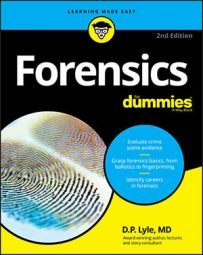Locating evidence can be straightforward: Someone calls the police to report a burglary, and when the police arrive the victim invites them in and shows them the location of the pried-open window, the family safe, and the perpetrator's escape route. But, in other cases, the probable location of the evidence is not always associated with a crime scene, and police are not invited into the area where the evidence may be located.
For example, the murder weapon or other important evidence such as the victim's blood or hair may be in the suspect's home or car. Such items may provide important circumstantial evidence that the suspect is indeed the perpetrator of the crime. However, to enter and search the suspect's residence or vehicle, investigators need a reason for the search that is acceptable to a judge and, ultimately, a search warrant.
Obtaining a search warrant
The Fourth Amendment to the United States Constitution protects citizens "against unreasonable searches and seizures," which means that police personnel and crime-scene investigators need a warrant before they can search for evidence.
This warrant must be specific about the time and place of the search, the items investigators are looking for, and it must be obtained on the basis of probable cause, a solid legal reason approved by a judge. Only a law enforcement officer can obtain a search warrant. Attorneys and private investigators can't, and neither can you.
The steps that are required to obtain a valid search warrant are
Preparing an affidavit.
This affidavit must describe the location to be searched, the items to be searched for, and the reasons why the officer expects the items are at the location (probable cause).
Preparing the warrant.
This step results in the official document that the judge must sign giving permission for the search to take place.
Getting the warrant signed.
The officer must present the warrant and affidavit to the judge. If the judge thinks probable cause for the search exists, he signs the warrant, making it official.
Sounds simple enough, doesn't it? Often it is, but at other times, obtaining a search warrant can be difficult. Probable cause can be one of the first issues to raise a flag. The officer must have a strong, concrete reason for believing that the items to be searched for are at a specific location.
A mere hunch or suspicion won't work. Say, for instance, that an arms dealer has a safe house from which he sells his wares, and police have observed known arms sellers coming and going with boxes and crates that potentially contain guns. Maybe police even know to whom one of the middlemen has sold illegal weapons. When combined, these factors are more than a hunch and provide solid evidence that packages arriving at and leaving from the house contain weapons.
Another problem is that the warrant must state exactly what police are looking for. Thus, police tend to add any and all items they think may be present. If police happen to find other evidence while they're conducting a legitimate search for the items listed in the warrant, then that evidence can, in most cases, be seized.
If the object of the search warrant is a gun crate, police can search only areas in which such a crate can be concealed. Rooms, attics, closets, and basements are searchable, but a kitchen drawer is not. So, if police open a drawer and find a gun, they can neither seize it nor use it in court.
As a result, police try to include a number of small items in the warrant, because doing so enables them to conduct a much more extensive search. In the case of the arms dealer, police may include drugs, which can be hidden almost anywhere, in the warrant. If the judge believes police have probable cause to search for drugs, police then can look through the kitchen drawers and even the breadbox.
Creating yet another difficulty, the area to be searched must be explicitly defined. If a search warrant identifies a house, but doesn't specifically mention that the garage and storage shed can be searched, then those areas are off limits. If the warrant lists a garage but not the car inside, then the garage can be searched but not the car.
Searching without a warrant
Certain special circumstances allow police to search without a warrant. The Supreme Court has allowed warrantless searches to stand in the following situations:
Emergent situations: When an emergency exists and someone's life or health is in danger, police may enter a building or other structure (including a vehicle) without a warrant. Any evidence that is found under such circumstance may be admissible in court. However, police officers cannot make an emergency entrance, leave, and return at a later date to search for evidence. This second entry requires a warrant.
Impending loss of evidence: This exception applies in situations where a suspect or some other agent or outside influence, such as a structure fire, threatens to destroy evidence.
Lawful arrest: Whenever someone has been arrested lawfully, the suspect and any property in the suspect's immediate control, such as a home or a vehicle, can be searched for evidence.
Consented search: No warrant is needed when the parties who are subjected to a search of their person or property have given police their consent.

